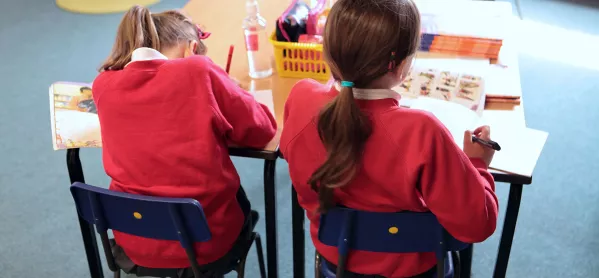It’s almost half term and it’s been a long six weeks for teachers’ vocal chords.
All instructions in Years 3 and 4 are currently being delivered sotto voce and the Year 1 teacher is using a tambourine to gets the kids’ attention.
For a teacher in cold and flu season, your voice is often the first thing to give.
I’ve heard of schools bringing in voice coaches to train teachers to speak from the diaphragm and deliver the phonics session like John Gielgud but sadly, at my school, there’s no sign of that. So we’re stuck with the tambourines.
I haven’t lost my voice (one of the benefits of working part-time) so when it comes to teacher talk, I’m hogging the limelight.
I’m still not sure if this is a good thing or not.
To be honest, I can’t keep up with whether teacher talk is currently viewed as manna from heaven or the work of the devil. I remember a time when it was definitely frowned upon.
Getting teacher talk right
Teachers were encouraged to pipe down and let children chat their way through equivalent fractions and use of the semicolon unencumbered by distracting explanations. It was only when lessons turned into extended break times punctuated by mini plenaries to summarise “learning” that it became apparent that a spot more intervention wouldn’t go amiss.
What’s actually needed is a healthy balance of both. Primary-aged children need to talk through what they’re doing. The challenge is how to manage this in a way that aids learning and not their sticker collections. Like everything else in teaching, speaking and listening has to be tailored to the needs of the children you have in front of you - which of course, can be incredibly diverse.
Take Kacey. Kacey doesn’t really do speaking. She appears to be listening but it’s hard to tell what’s going on behind the eyes. Her written work shows she’s pretty much grasped the lesson but trying to get her to contribute in any sort of discussion is like trying to lure an agoraphobic badger out of its sett.
And then there’s George. George talks incessantly, regardless of whether anyone is listening or not (or even whether anyone is in the vicinity). From the moment he enters the classroom chuntering on about his breakfast and his missing glove to the time I deliver him back to his mum in the playground. He is like a 10-year-old Virginia Woolf novel on legs.
George is so busy carrying on his personal monologue about where his pencil is and why haven’t I added his dojo point from yesterday that getting instructions to seep through the waterfall of his external thoughts is no mean feat. Even when I’d turned off the tap for long enough to get him to focus on the fraction problem I’d set for him, I could still see his lips moving silently.
But for every child who listens but doesn’t speak or speaks but doesn’t listen, you have the ones who do both perfectly - sometimes dangerously - well.
Like Millie. She has a skill of listening to everything I say then calling me out on it. Just last week we had a DT day where I explained to her that her proposal to make a rolling marble set off a lever by flipping a piece of cardboard in the air was a physical impossibility.
“Trust me,” I said. “It’s not going to work”.
She looked at me and sighed.
“That’s the problem with you teachers,” she told me. “You spend ages telling us to take risks and reach for the stars and when we do, you tell us it’s not going to work.”
I laughed and gave her five dojo points. Sometimes, kids are brilliant.
Jo Brighouse is a pseudonym for a teacher in the Midlands. She tweets @jo_brighouse




